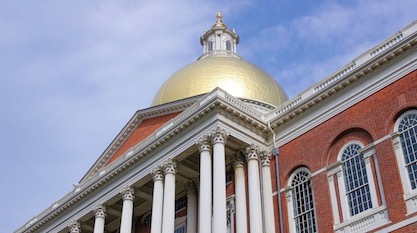 Education
Education
 Free Speech
Free Speech
In Massachusetts, Spreading Myths About Academic Freedom Legislation

A Massachusetts newspaper, the Bedford Minuteman, has an article mentioning the academic freedom science education laws in Tennessee (2012) and Louisiana (2008). Unfortunately, it appears there is still widespread misunderstanding about these pieces of legislation.
The reporter, Kathleen Cordeiro, interviewed Abby Hafer, a scientist who teaches at Curry College. We learn that Dr. Hafer helped to draft a new bill — the state’s House Bill 471. This legislation was crafted specifically as the antithesis of academic freedom laws. Hafer wanted it to be “model legislation for protecting science education.” The bill provides that “standards for the subject of science shall include only peer-reviewed and age-appropriate subject matter.”
A Great Deal of Misinformation
Cordeiro writes:
Hafer is not aware of any Bay State public school teaching students intelligent design instead of evolution, or denying climate change in classroom lessons. Her concern is not that this has already happened in Massachusetts. Her concern is that there is nothing to prevent it….
Two states have passed laws to include non-scientific materials into public school curricula — Louisiana in 2008 and Tennessee in 2012. “Those things didn’t happen in a vacuum,” said Hafer, pointing to organizations that promote science denial and help legislators draft model legislation.
“So I decided there should be model legislation for protecting science education,” she said. Hafer believes Massachusetts is the best first place to have model legislation. “I want to protect students and I want to protect teachers.” [Emphasis added.]
In those few paragraphs, there’s a great deal of misinformation about academic freedom laws, how they harm science teaching and imperil students and educators. I’d like to explain what such legislation actually does.
As I’ve noted previously, academic freedom laws are very limited in their scope. They do not authorize bringing in material on intelligent design, nor make teachers teach anything differently. They simply provide freedom for teachers and students to analyze the strengths and weaknesses of controversial scientific issues in the curriculum in an objective fashion. They protect teachers and students who want to engage in scientific inquiry, which means examining evidence critically. If science is defined as investigating nature objectively, then they represent the opposite of “science denial.”
Easy to Denigrate
It’s easy to denigrate academic freedom bills in the popular media, especially where there’s no link to the actual laws for readers to check them out and see what they actually say. But if one looks at the text of these laws, their intent is clear: see the Tennessee law here, for instance, which “only protects the teaching of scientific information.”
Here’s what the co-author of HB 471, Representative Ken Gordon, told Kathleen Cordeiro:
It is critical that our state’s students are exposed to reliable, fact-based science in a public school science class.
Agreed! He goes on:
There is no room for alternative explanations for evolution in our public schools. There is no place for climate change deniers.
All I can say is, that’s a lot of polarizing labeling instead of digging into the facts about academic freedom legislation.
What I find funny is that the actual text of HB 471 is something I’d agree with. It simply stands behind solid science. Peer-reviewed, age-appropriate science? Bring it on!
Photo: Massachusetts State House, by Domenico Bettinelli, via Flickr (cropped).
